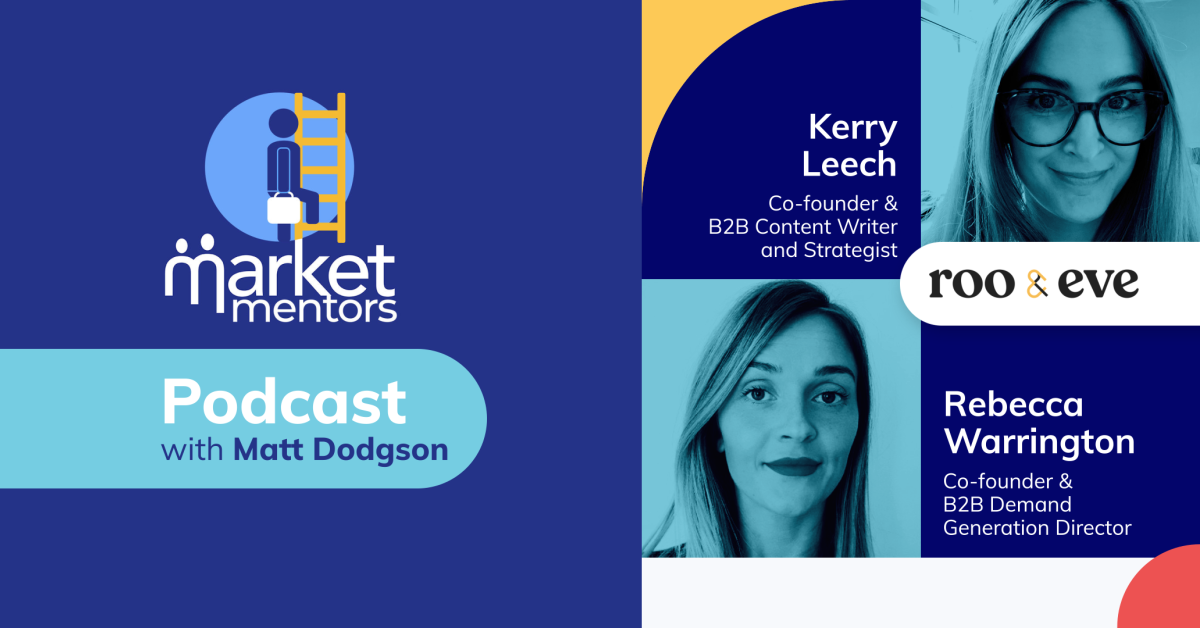
One of the biggest challenges for B2B fintechs in 2023 is how to create demand. With the well publicised demise of Silicon Valley Bank, rising global interest rates, and a cooling of major economies, venture capital funding in the sector is down by a whopping 83% in Q1 of 2023 compared to the same period in 2022. And this all has an impact on growth.
But despite these challenges, there are real opportunities for marketers at B2B fintechs to transform how they drive demand.
And in this podcast episode, I talked with Kerry and Rebecca about a framework they created in partnership with Nottingham Trent University for content marketing within the context of demand generation. This framework aims to help fintechs create content that aligns with where buyers are in their journey, and it can be a game-changer for fintechs looking to create and capture demand.
Who they are: Rebecca Warrington and Kerry Leech, Co-Founders of Roo & Eve.
A bit of background: With over 25 years of experience in the B2B marketing space, Kerry and Rebecca both worked in marketing for Experian before moving agency-side and then starting Roo & Eve together in 2020.
Where you can find Rebecca and Kerry:
Connect with Rebecca on LinkedIn here:
https://www.linkedin.com/in/rebeccaclairewarrington/
Connect with Kerry on LinkedIn here:
https://www.linkedin.com/in/kerryleech/
The framework Rebecca and Kerry developed is based on the concept of demand generation, but with a particular focus on demand gen content marketing. And it’s an approach they’ve successfully used with their B2B fintech clients.
▶︎ Read their case study here.
At a high level, it’s an approach that helps B2B fintechs build trust and authority with their target audience. Too often, companies talk about their products or solutions rather than focusing on helping their prospects solve problems.
The framework also takes buyers through the journey of becoming problem aware, solution aware, and ready to buy. By understanding where buyers are in this journey, companies can create content that speaks to their needs and interests.
Kerry adds, “So I think there’s a lot of buzz noise and talk around demand generation at the moment, but no one’s really defined how content marketing sits within that. And as far as we’ve found, there doesn’t appear to be an actual framework for content marketing within the context of demand generation.”
On top of the core challenges we discussed earlier, fintech marketers also face a number of challenges as markets become more saturated. So having a content marketing strategy is crucial to growth.
Rebecca explains, “So I think the trust element is standing out and then the audience is quite technical. So you need to really understand the audience and their pain points and be able to understand at that high level what the challenges are and how to fix it. And I think that’s where you can’t be using your AI writing tools…you really need to pull out the expertise out of the FinTech organisation to be able to offer solutions to problems with free tips and guidance. It’s basically about adding value and being able to help solve a problem.”
Modern B2B buyers have a strong inclination towards self-education. This is particularly true for the fintech audience, which often possesses a high level of technical expertise. Consequently, relying on generic or superficial content is ineffective. To truly engage with this audience, it is essential to provide valuable, advanced, and thought-leading advice that genuinely assists and educates them.
As Rebecca mentioned earlier, the fintech market is saturated. So creating great content is a proven way to differentiate your company. Every piece of high-quality content showcases your knowledge and expertise. By offering valuable insights and adding real value, your content becomes memorable, instilling trust in potential customers. So when they are ready to make a purchase, they are more likely to choose your fintech solution over others.
Marketers often refer to this as demand creation.
As we know, there are c10% of ‘active’ buyers in any market. And your content plays a vital role in building sustainable, long-term sales pipelines with those active buyers. By targeting your desired audience effectively with your content, you can capture those active buyers.
Plus, content supports sales teams by providing educational material that can be used throughout the sales process to help win deals and increase pipeline velocity.
▶︎ The Ultimate Guide to FinTech Talent: How to Work Well with FinTech Recruitment Agencies
So we’ve established that content marketing is highly effective for B2B fintech companies. Rebecca and Kerry described how, by creating valuable content that addresses the pain points of their customers, these companies can establish themselves as thought leaders in their industry and build relationships with their audience.
To implement this framework, Kerry and Rebecca suggest that B2B fintech companies should follow these four steps:
By leveraging the power of content marketing, B2B fintech companies can attract and engage their target audience, drive traffic to their website, and generate leads for their business.
But where can this fall down?
Kerry explains, “..most people fall down on executing consistently. Because sometimes this is a long term approach, so you can’t expect within two weeks to suddenly radically change your entire revenue stream. It does take, I would say between three to six months to start seeing proper results. And from that point it only then gets better and better and better.”
Hiring? As a leading B2B fintech recruitment agency, we can help you hire the marketers you need to help you scale.
Subscribe to our fortnightly newsletter to hear about our latest podcasts, blogs, career advice & jobs.